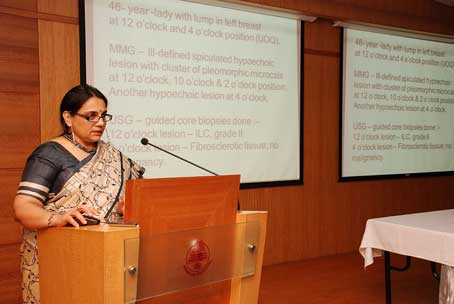|

Dr. Anita Bhaduri, M.D. (Pathology) at the Pathology Update conference
In the era of targeted therapies in Oncology, the Surgical Pathologist is an important member of the tumour management team. Over 70% of diagnoses and treatment decisions in Oncology are made based on lab test results. Laboratory testing identifies not only the tumour type but also various other parameters and prognostic markers that enable the treating Oncologist frame the most appropriate treatment and predict expected outcomes.
Thus, it is only appropriate that the American Association of Physicians of Indian Origin (AAPI) chose to take up Surgical Pathology as a subject to discuss. The seminar was presented by Dr. Jaishree Jagirdar, Dr. Sunil Badve and Dr. Satish Tickoo.
Dr. Anita Bhaduri, M.D., Surgical Pathologist, Hinduja Hospital said, "The three cancers that have seen vast changes in therapy and molecular biology in the last decade are those of the breast, kidney and lung. It is important for Surgical Pathologists to keep abreast of management strategies and to identify lesions accurately in order to justify the treatment and achieve optimum results. The College of American Pathologists (CAP) accredited Hinduja labs have always been in the forefront of medical advances and we are happy that the Continuing Medical Education CME is being held here jointly with AAPI."
The conference initiates collaborations of physicians between institutions in India and USA in this field. Faculty from leading American institutes made presentations on the state-of-the-art pathology tests / techniques now available for three subspecialties and also discussed what is on the horizon in the next five years. The seminar also emphasised on practical approach to pathology of the lung, breast and kidney, detailing areas which are often viewed as difficult by general surgical pathologists.
Speaking about participating in such a seminar, Dr. Navin Shah, Ex-President, AAPI, said "The overall aim was to help pathologists recognise diagnostic pitfalls, be updated with recently described entities in the said subspecialties and to learn to incorporate clinical information with morphology and latest ancillary diagnostic methodologies into their practice."
Some of the important topics discussed in the seminar were: Role of traditional and molecular prognostic markers in the sub- classification and management of breast cancers; Renal cell carcinoma: some recently recognised entities; and update on neoplastic and cystic lesions of the lung.
|
